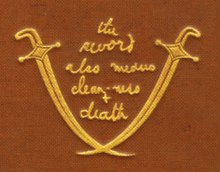The Seven Pillars of Wisdom

Tooling on the cover of the first public printing, showing twin scimitars and the legend: "the sword also means clean-ness + death"
|
|
| Author | T. E. Lawrence |
|---|---|
| Country | United Kingdom |
| Language | English |
| Publisher | private edition |
|
Publication date
|
1922 |
| ISBN | |
| OCLC | 54675462 |
Seven Pillars of Wisdom is the autobiographical account of the experiences of British soldier T. E. Lawrence ("Lawrence of Arabia"), while serving as a liaison officer with rebel forces during the Arab Revolt against the Ottoman Turks of 1916 to 1918.
The title comes from the Book of Proverbs (Proverbs 9:1): "Wisdom hath builded her house, she hath hewn out her seven pillars" (King James Version). Prior to the First World War, Lawrence had begun work on a scholarly book about seven great cities of the Middle East, to be titled Seven Pillars of Wisdom. When war broke out, it was still incomplete and Lawrence stated that he ultimately destroyed the manuscript although he remained keen on using his original title Seven Pillars of Wisdom for his later work. The book had to be rewritten three times, once following the loss of the manuscript on a train at Reading. From Seven Pillars, "...and then lost all but the Introduction and drafts of Books 9 and 10 at Reading Station, while changing trains. This was about Christmas, 1919." (p. 21)
Seven Pillars of Wisdom is a biographical account of his experiences during the Arab Revolt of 1916–18, when Lawrence was based in Wadi Rum (now a part of Jordan) as a member of the British Forces of North Africa. With the support of Emir Faisal and his tribesmen, he helped organise and carry out attacks on the Ottoman forces from Aqaba in the south to Damascus in the north. Many sites inside the Wadi Rum area have been named after Lawrence to attract tourists, although there is little or no evidence connecting him to any of these places, including the rock formations near the entrance now known as "The Seven Pillars".
...
Wikipedia
